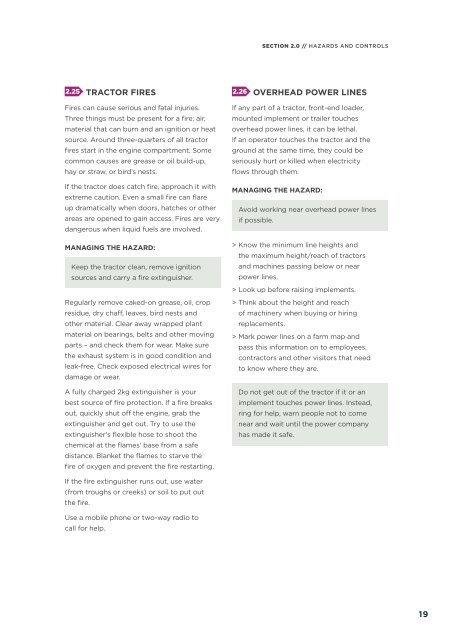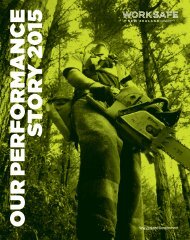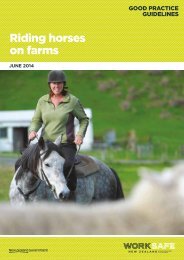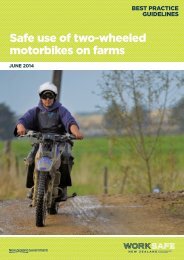tractors-on-farms-pdf
tractors-on-farms-pdf
tractors-on-farms-pdf
You also want an ePaper? Increase the reach of your titles
YUMPU automatically turns print PDFs into web optimized ePapers that Google loves.
SECTION 2.0 // HAZARDS AND CONTROLS2.25 TRACTOR FIRESFires can cause serious and fatal injuries.Three things must be present for a fire: air,material that can burn and an igniti<strong>on</strong> or heatsource. Around three-quarters of all tractorfires start in the engine compartment. Somecomm<strong>on</strong> causes are grease or oil build-up,hay or straw, or bird’s nests.If the tractor does catch fire, approach it withextreme cauti<strong>on</strong>. Even a small fire can flareup dramatically when doors, hatches or otherareas are opened to gain access. Fires are verydangerous when liquid fuels are involved.MANAGING THE HAZARD:Keep the tractor clean, remove igniti<strong>on</strong>sources and carry a fire extinguisher.Regularly remove caked-<strong>on</strong> grease, oil, cropresidue, dry chaff, leaves, bird nests andother material. Clear away wrapped plantmaterial <strong>on</strong> bearings, belts and other movingparts – and check them for wear. Make surethe exhaust system is in good c<strong>on</strong>diti<strong>on</strong> andleak-free. Check exposed electrical wires fordamage or wear.A fully charged 2kg extinguisher is yourbest source of fire protecti<strong>on</strong>. If a fire breaksout, quickly shut off the engine, grab theextinguisher and get out. Try to use theextinguisher’s flexible hose to shoot thechemical at the flames’ base from a safedistance. Blanket the flames to starve thefire of oxygen and prevent the fire restarting.2.26 OVERHEAD POWER LINESIf any part of a tractor, fr<strong>on</strong>t-end loader,mounted implement or trailer touchesoverhead power lines, it can be lethal.If an operator touches the tractor and theground at the same time, they could beseriously hurt or killed when electricityflows through them.MANAGING THE HAZARD:Avoid working near overhead power linesif possible.> > Know the minimum line heights andthe maximum height/reach of <str<strong>on</strong>g>tractors</str<strong>on</strong>g>and machines passing below or nearpower lines.> > Look up before raising implements.> > Think about the height and reachof machinery when buying or hiringreplacements.> > Mark power lines <strong>on</strong> a farm map andpass this informati<strong>on</strong> <strong>on</strong> to employees,c<strong>on</strong><str<strong>on</strong>g>tractors</str<strong>on</strong>g> and other visitors that needto know where they are.Do not get out of the tractor if it or animplement touches power lines. Instead,ring for help, warn people not to comenear and wait until the power companyhas made it safe.If the fire extinguisher runs out, use water(from troughs or creeks) or soil to put outthe fire.Use a mobile ph<strong>on</strong>e or two-way radio tocall for help.19







